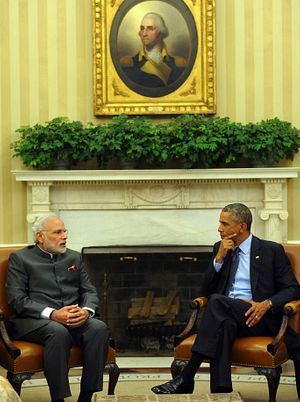The United States has long urged India to play a more active strategic role in world affairs—a role commensurate with the image India likes to project of itself as a powerful democracy, and with its leaders’ proclamations of their country as a “natural partner” of the United States.
By and large, New Delhi has resisted this American request on the grounds that its interests are better served by non-alignment, non-interference, and, when it comes down to it, close relations with U.S. adversaries such as Iran and Russia.
And yet for Washington, urging India to play a more active global role may actually amount to a proverbial case of kicking in an open door.
Indeed, there are increasing signs that India is in fact beginning to play a bigger role in the world—or at least in Asia. Prime Minister Narendra Modi is spearheading a substantive shift in India’s approach to strategic affairs—one that the U.S. media has failed to highlight, including during Modi’s recent trip to the United States. And yet the conversion of the previous Indian administration’s “Look East” policy to Modi’s “Act East” mantra may ultimately prove to be a major boon for the U.S.-India strategic relationship.
It now appears that India is prepared to take a far more activist role in East Asia than it has in the past. In effect, it is launching a “pivot” to accompany the Obama administration’s own pivot, or rebalance, to the broader Asia-Pacific (the U.S. pivot, after several years of uncertainty, appears to have new momentum, with Obama having made a long trip to Asia earlier this year and an additional one planned in the coming weeks). In a move that caught Beijings attention, India and the United States issued a joint statement during Modi’s visit to Washington that designates the South China Sea as an area of importance for safeguarding maritime security and ensuring freedom of navigation.
This designation is linked explicitly with concerns about rising tensions over maritime territorial disputes, where China plays a prominent role. Driving home this Indian pivot is Modi’s expression of support, during his trip to Washington, for the reinvigoration and upgrading of the Malabar joint naval exercises (which have taken place in East Asia and typically includes the participation of Indian and American fleets), a 10-year extension of the George W. Bush-era U.S.-India framework agreement for defense cooperation, and for the U.S.-India-Japan strategic dialogue (or “trilateral”)—including a possible upgrade to the ministerial level.
One of the chief drivers of India’s increasing engagement with East Asia is energy and, more specifically, oil. With India’s oil imports approaching 80 percent of its consumption, it’s clear that New Delhi is increasingly concerned about maritime security. It is also clear that India is looking to the South China Sea as a source of its energy needs. Just prior to Modi’s trip to the United States, Indian President Pranab Mukherjee was in Hanoi signing an offshore oil exploration agreement with Vietnam. The overseas investment subsidiary of India’s state-owned Oil and Natural Gas Corporation, which is called ONGC Videsh, had already been exploring for oil and gas in two blocks off the Vietnam coast. It will now take on new territories for exploration.
The joint statement in Washington also addressed the issue of North Korea’s nuclear weapons and ballistic missiles. In a move sure to please Modi’s friend, Japanese Prime Minister Shinzo Abe, India and the United States urged North Korea to take concrete action on denuclearization and to meet its obligations under UN resolutions and the six-party talks.
The most hopeful sign that India’s “looking” has turned to “acting” may be that Indian National Security Advisor Ajit Doval stayed behind in Washington after Modi’s departure. Doval had substantive talks with Secretary of Defense Chuck Hagel, National Security Advisor Susan Rice, and Secretary of State John Kerry. The readouts from these meetings were all positive. Notably, Doval’s conversation with Rice included discussion of cooperation on maritime security.
Too often in the past, Indian policy pronouncements have been just that—pronouncements with no follow-up leading to action. Modi appears intent on implementation—leading to the conclusion that his policy of “Act East” may actually be a sea change, or a South China Sea change to be exact.
If so, then the recent Modi-Obama summit represents a key step toward the consummation of a strategic Asian pivot for both India and the United States.
Michael Kugelman is the senior associate for South Asia at the Woodrow Wilson International Center for Scholars in Washington, DC. Ray Vickery is a Senior Advisor at Albright Stonebridge Group, Of Counsel at Hogan Lovells, and former Assistant Secretary of Commerce and Woodrow Wilson Center Public Policy Scholar.

































